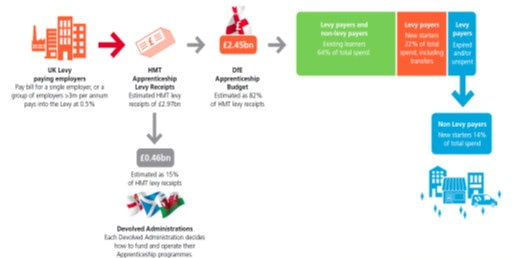Apprenticeship funding for non-levy payers (in England): Is the solution 1990…?

One of the last unresolved areas policy areas within the current Apprenticeship reform is that of long-term funding for non-Levy payers (SMEs for short hand).
Large companies have started to make use of the new levy system but SMEs are in danger of being left behind.
This has come to a head recently as the IFA seems to have peered into the future and spotted a £500m funding shortfall just around the corner (the phantom funding presentation)…
This is worrying of course (if accurate) and a lack of money seems counter intuitive to the other Apprenticeship headlines (‘starts down 30%’ and ‘Levy 85% unspent’.)
One might have imagined that if the Levy has been so underutilised by the companies paying it, that there would actually be a surplus not a shortfall.
Unless take up was predicted (and designed) to be even lower than it actually is….or the IFA just needs a reason to justify its annual funding rate cuts in the face of falling starts. But let’s not be too cynical at the start of a new year!
DFE / ESFA published Apprenticeship funding flow – with SME funding last
The apprenticeship levy – where the money goes.
Levy income and forecast spend for 2019-20

The flow of funding
- I think this recent DFE/ESFA diagram (above) shows that DFE imagines it will have c£2.45bn to spend on Apprenticeship in 2019-20 (FY) based on total levy receipts
- This more or less matches the indicative figure of 2.3bn (for 2019-20) that was forecast for 2019-20 in the 2017 ESFA funding grant
- And it also shows that DFE expects to devote 14% of total Apprenticeship spending on SME starts (c£340m PA) – and that new starts at SMEs appear to be its very last priority… hence the concern that if the previous claimants on the funds ‘over use’ there will be nothing left for SMEs.
As it is the SMEs who often provide the high valuable entry level opportunities for younger people to gain work via Apprenticeships – no wonder AELP have asked for Apprenticeship funding for SMEs to be ring-fenced.
Impact of Apprenticeship reforms on regions
Moving away from a system of localised grants (LSC / SFA system) to a more ‘free’ market model (ESFA/Levy) has not just affected SMEs but also started to geographically move activity and funding.
The previous ‘system’ intervened to focus funding where it was seen to be needed; areas of higher unemployment, deprivation and with lower qualification levels were allocated disproportionally higher amounts by the LSC/SFA (i.e. the North and Midlands).
But the Levy is moving funding to areas of high employment density and higher wages, as it follows employment (Levy) patterns rather than social policy priorities.
My own region of the West Midlands has been one of the hardest hit as funding goes South…
Reduction in Apprenticeship starts per region per Academic year |
||||
|
|
15/16 |
16/17 |
17/18 |
Reduction (16/17 to 17/18) |
|
East Midlands |
48,080 |
47,540 |
33,690 |
29% |
|
East of England |
46,650 |
44,950 |
36,700 |
18% |
|
London |
46,280 |
44,380 |
36,830 |
17% |
|
North East |
38,210 |
33,940 |
22,640 |
33% |
|
North West |
80,820 |
79,720 |
58,120 |
27% |
|
South East |
65,290 |
63,590 |
52,550 |
17% |
|
South West |
54,160 |
53,550 |
43,430 |
19% |
|
West Midlands |
60,910 |
60,330 |
42,650 |
29% |
|
Yorkshire and The Humber |
63,520 |
61,150 |
44,580 |
27% |
https://www.gov.uk/government/publications/fe-data-library-help-for-finding-data
So who will champion the regions and the SMEs?
In 1990 the Training and Enterprise councils were set up to localise skills funding and better match local economic needs with skills provision. (This was also the start of devolution of funding across the ‘nations’).
In particular they were designed to help smaller employers and to support local economic priorities.
Could the combined local authorities fulfil the same role now?
We have already started to devolve AEB budgets so why not Apprenticeships.
I was at an interesting meeting recently where this was being considered by the West Midlands Combined Authority (WMCA). Their plan is to ask for ‘donations’ from large employers with unspent levy funds and to reallocate them using the 10% / 25% transfer system to SMEs in the Midlands.
Thus, saving those SMEs that meet the WMCA’s ‘criteria’ the cost of their 10% contribution and the time and trouble of finding a provider with an allocation of SME funding. And at the same time creating more opportunities for ‘local’ people to re-train or upskill.
With no sign of a DAS system for non-levy payers – maybe a new localism is a potential solution.
Avoiding a post code lottery
The WMCA pilot is interesting attempt to make the levy more relevant locally and we are happy to support it.
For those SMEs who qualify, it will mean no fees and no more chasing provider allocations, but it could also lead to a ‘postcode lottery’ as each local area decides what its priorities are and focuses funding accordingly.
As it is dependent upon the levy surpluses of large employers it is not able to provide long term stability, as large employer’s priorities (and underspends) will fluctuate. And however well managed it will introduce complexity as employers and providers who work across unseen regional borders would encounter multiple rule sets.
So how could we take a local approach to SME funding and support?
If DFE ring fenced a sensible amount of funding for SME apprenticeships each year, this would provide market certainty and allow for the longer-term investment and decision making that Apprenticeships require.
Maybe they could reallocate the 10% top up that is automatically added to English Levy pots too – it seems daft to be adding 10% to unspent levy pots
This fund could then be managed by local bodies, but with some common rules, i.e. no contributions for those with less than 250 staff for example, etc. And local areas could focus it on the roles that they see the greatest need for (as long as they don’t all restrict it to L3+ ‘STEM’ learning…)
If local bodies held this funding in a central pot and allocated as needed then there would be no further need for annual national provider allocations or ‘just for funding’ subcontracting and it would give local bodies and SMEs a common cause.
For national providers such as ourselves, with 100’s of SME clients across the country – it would mean holding dozens of local funding contracts, rather than just the current one – but this is probably better than supporting 100’s of SMEs to use the DAS system (as is currently planned).
Let’s go Deutsch
The skills minister recently suggested something else that could be used to supplement this approach. College – Independent Training Provider delivery partnerships.
This is an interesting model, and could work well in a more localised system; especially in areas where local colleges have expertise and are underutilised in Apprenticeships.
It is the model used in the so called ‘dual-system’ of Germany, Austria etc. In the dual system the training providers and employers do the on-the-job assessment and end-point assessment respectively, with the theoretical training taking place in a Vocational school (FE college equivalent).
Hence the term ‘dual’ as the programme has two providers and two simultaneous tracks.
In the English context, Training Providers could contract with employers and then, where appropriate, bring in Colleges to provide the ‘Knowledge’ element of the Apprenticeship via a study programme/ qualification.
Especially where this element is suited to classroom study or requires specialist training facilities that are not easily otherwise accessible for SMEs or smaller providers who cannot support a whole cohort themselves.
Splitting responsibilities – and funding – this way could be helpful in terms of making greater use of the College estate and Curriculum expertise in Apprenticeship, in particular for SMEs. But it is not easily worked into the Levy system or the increasingly restrictive funding bands.
Even if it is not possible across the board, I am sure that local provider partnerships based on the deployment of expertise holds some of the answers for SMEs.
In an age of difficult decisions and multiple models – it might just be time that we tried something different in Apprenticeships too.
Richard Marsh, Apprenticeship Partnership Director, Kaplan Financial
Copyright © 2018 FE News



Responses